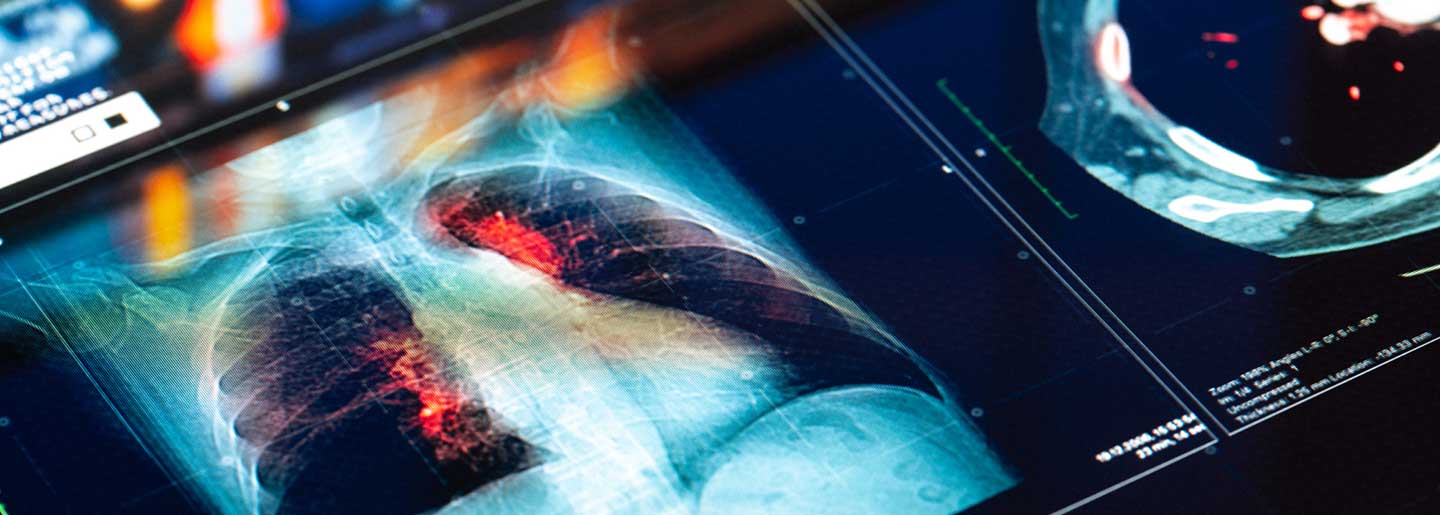
Lung Cancer Center of Excellence
Lung cancer is the leading cause of cancer death for men and women, and Florida is second behind California in the number of new lung cancer cases each year. This is why Moffitt established a Lung Cancer Center of Excellence in 2008.
Lung cancer is one of the most complex cancers, both at the molecular level and through its clinical behavior. Led by Eric Haura, M.D., the Lung Cancer Center of Excellence brings together highly complex scientific teams to break down barriers and focus on transformative steps to prevent and treat lung cancer.
Utilizing the expertise of our scientists and recognizing the emerging complexity of lung cancer, the Lung Cancer Center of Excellence has identified four thematic research approaches:
- Charting the Lung Cancer Proteome
Lung cancer is recognized to be a disease caused by altered genes that turn normal cells into cancer cells. These genes, encoded by DNA, are the blueprints for cancer proteins, which are the machines that actually drive cancer cell growth and spread. Our investigators have been pioneers in applying the field of cancer proteomics to the study of lung cancer biology. Proteomics uses advanced state-of-the-art mass spectrometry technology to measure thousands of proteins from lung cancer cells and tissues, providing a system wide and unbiased view of lung cancer architectures. Leveraging the increasing knowledge of the lung cancer DNA ‘blueprint’, we will develop next generation approaches to characterize the lung cancer proteome. This approach offers new insights into how lung cancer may grow, evade attack by the immune system, spread to other vital organs – success can translate into better treatment approaches, biomarker approaches to guide clinical treatment decisions, and offer new approaches to early detection and prevention. - Optimizing Immune-Based Lung Cancer Therapy
There have been several remarkable discoveries in recent years relating immune therapy for lung cancer. The finding that a single intervention with anti-PD1/PDL1 can reverse tumor mediated evasion of immune-mediated killing suggests that there are “driver” immunosuppressive mechanisms operational in subsets of lung cancer patients. Capitalizing on our strong immune biology and immune therapy investigators, our research teams aim to foster new insights into how lung cancer cells evade recognition and attack by the immune system. We will develop new clinical trials that directly test and translate laboratory findings into curative approaches for advanced lung cancer. And also develop biomarker approaches that can guide clinical decision-making for physicians on how to best treat lung cancer patients with immune-based therapy. - A Comprehensive Plan for Early Disease Management
Surgical resection of early-stage lung cancer remains the most reliable curative strategy for the disease. However, despite surgery for small tumors, the relapse rate can remain high. And when postoperative chemotherapy is indicated, it can often cause adversely affects to quality of life and still lead to relapse. Using insights gathered about the biological behavior of lung cancer, our scientists will develop a comprehensive plan to manage patients at the with early stage lung cancer. This will include establishing biomarker strategies that can guide management decisions on surgical resection and guide post-operative management. Success will lead to improved cure rates coupled with better quality of life, minimizing use of unnecessary and overly aggressive treatments for individual patients. - Prevention and Screening
Tobacco unfortunately remains the largest risk factor for the development of lung cancer but we have known for years that not all smokers develop the disease. And even those who never smoked can develop lung cancer. Individuals may react differently to instigators of lung cancer and either engage repair programs or immune cells to rid the body of early cancerous lesions, or fail to recognize these pre-cancerous cells leading to ultimate development of full-blown lung cancer. Our researchers will develop a comprehensive screening approach utilizing new imaging modalities and biomarker discoveries. Additionally, strategies will be developed to reduce tobacco smoking through collaborations with the Tobacco Research and Intervention Program, a unique and highly experienced group of investigators who study tobacco addiction. We will determine the impact of smoking on treatment outcomes, especially those in clinical trials, and study the impact of nicotine and other derivatives of tobacco smoke on lung cell biology.
Director
Eric Haura, MD
Members
Daniel Abate-Daga, PhD
Amer A. Beg, PhD
Theresa Boyle, MD, PhD
Y. Ann Chen, PhD
Dung-Tsa Chen, PhD
Alberto A. Chiappori, MD
John Cleveland, PhD
Ben C. Creelan, MD
W. Douglas Cress, PhD
Gina DeNicola, PhD
Derek Duckett, PhD
Steven Allen Eschrich, PhD
Elsa Flores, PhD
Ana Gomes, PhD
Daniel Grass, MD, PhD
Jhanelle Gray, MD
Mark Ji, PhD
John M. Koomen, PhD
Andriy Marusyk, PhD
Alvaro NA Monteiro, PhD
David L. Morse, PhD
Bruna Pellini, MD
Bradford Perez, MD
Uwe Rix, PhD
Timothy Robinson, MD, PhD
Paulo Rodriguez, PhD
Steven Rosenberg, MD, MS
Brian Ruffell, PhD
James Saller, MD
Andreas Saltos, MD
Matthew B. Schabath, PhD
Michael Shafique, MD
Paul Stewart, PhD
A.C. Tan, PhD
Jamie Teer, PhD
